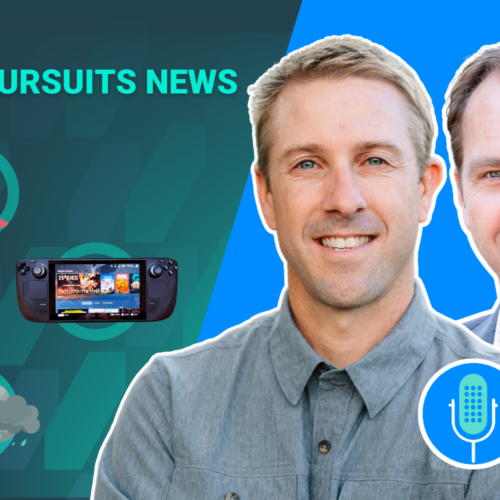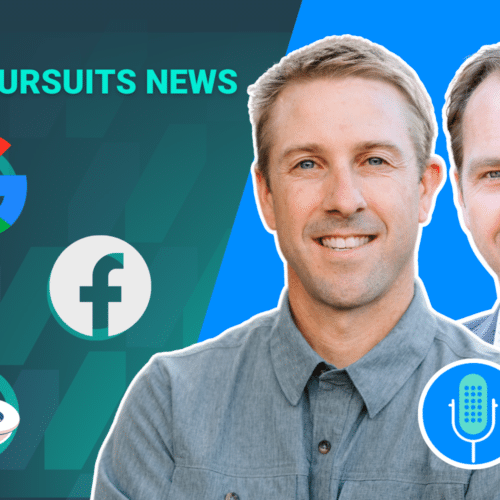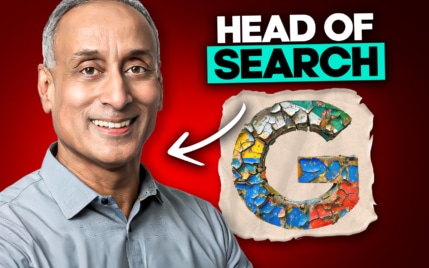Podcast 135: Matt Giovanisci’s Journey from Pool Guy to Massive Pool Affiliate Site

When you buy something through one of the links on our site, we may earn an affiliate commission.
I really enjoyed sitting down with Matt Giovanisci and having him on the podcast.
Matt is the owner of MoneyLab.co and SwimUniversity.com. I highly recommend that you check out both of his sites. Matt does a lot of cool “experiments” on MoneyLab that I think the Niche Pursuits audience would enjoy.
In this episode, you'll hear us discuss Matt's journey from working for a pool company for many years to eventually creating his own affiliate website in the pool space. The journey was pretty rough getting his site to where it is now.
This was definitely not an overnight success, but it's now making about $25,000 a month!
I think you'll find our discussion about how to focus on content and site speed instead of link building to be particularly interesting. Matt has never focused on link building and in fact believes that it will become less and less important as Google gets smarter and smarter.
Listen in for an interesting discussion!
Read the Full Transcript Below
Spencer: Hey, everyone. Welcome back to the Niche Pursuits Podcast. I'm your host, , from Niche Pursuits, of course. Today, I've got a guest with me. I'm excited to dive into what he's doing and what's working well for his businesses. I've got Matt Giovanisci from Money Lab. Matt, welcome to the podcast.
Matt: Hey, Spencer. Thanks for having me, man.
Spencer: Absolutely. We've connected over the last several months and it's great to finally sit down with you and have you on the podcast. I want to hear about your business but before I jump into what sites you're working on and that sort of thing, you sent an email out–I'm subscribed to your email list–a couple of weeks ago, and you tried some crazy experiment, I guess, with your podcast listing on iTunes and it got delisted. What happened and what's the latest with the podcast?
Matt: Yeah, I definitely got delisted. Here's what happened: There used to be a hack–we'll call it a hack–where, on iTunes, you can add a very long title for your podcast and a very long author, a section. In those two pieces, if you add the names of other podcasts or the names of other celebrities, because the iTunes search algorithm is so archaic, you could just rank for things that would be impossible otherwise. For example, you could say–I could add to the title something like “The Money Lab Podcast. It's like the Tim Ferriss show, but better,” and so anyone searching for the Tim Ferriss show in iTunes, I would come up in those search results on Day One, and that's just iTunes not really focusing too much on their algorithm and their search results.
We've had success with this at other podcasts that I've been a part of and I've done and so I've always–I wanted to do it for Money Lab but I don't want to come off swarm-y, douche-y, scam-y in any way, and so I really didn't want to do it because I just knew it would sound pretty bad but then my buddy, Andrew, had an idea to craft a sentence, a tagline of the podcast, that just happened to incorporate very popular podcast titles. For example, Startup is a very popular show on iTunes. It's also just a normal word that would make sense in my title.
I can actually pull it up because I'm actually really proud of the sentence that we created. I thought that what we did was–again, the idea was there and so I wrote–the title of the podcast was–and I changed it to this, by the way–”Money Lab: A Master Class in Online Business Stuff You Should Know About and Other Stuff to Blow Your Mind AKA Your Hidden Brain”. Now, in that sentence, Master Class is a podcast, Business Stuff is a podcast, Stuff you Should know is a Podcast, Other Stuff to Blow Your Mind is a podcast, and Brain is a popular podcast. Then, the author was “Money Lab: “Welcome to the Planet Money Lab Startup. Learn How I Built the Serial Podcast on the Rise. It's a Breath of Fresh Air to Lure You into Becoming More Like Oprah or Tim Ferriss. Also, My Favorite Murder Criminal is TED Bundyville. WTF?”
Spencer: This is genius.
Matt: First, I thought the author was funny because I've got Planet Money, Startup, How I Built This, Serial, Rise, Fresh Air, Oprah, Tim Ferris and then, at the end, I just wanted to divulge into nonsense, so “My Favorite Murder Criminal is Ted Bundyville.” My Favorite Murder is a podcast. Criminal's a podcast. TED is a podcast, Bundyville is a podcast, and WTF is a podcast.
Spencer: Wow, you really packed it in there.
Matt: I really packed it in there but it's a little bizarre sentence. I thought it was really clever and funny and so I took that. This is the dumb move that I did. I bragged. I went on Twitter and I said, “This is how you write a podcast title.” This is tongue in cheek. Then, somebody on Twitter was like, “Hey, Blueberry, which is a podcasting app, is seeing that Apple has been delisting podcasts that have this kind of title-stuffing thing,” and I looked for it. I went through Apple's term of services for adding podcasts to their platform and there was nothing in writing that said that I couldn't do this or that they frowned upon it, just nothing.
I reached out to Blueberry and I was like, “Give me an example because I was just assuming that they were delisting really spam-y podcasts, podcasts that don't really have good content and they're also doing this,” so I was just kind of like, “Well, I actually have a good podcast and I'm being funny so maybe they're not targeting people like me or podcasts like mine.” They said, “Oh, we see a bunch of people,” blah, blah, blah, and they responded back to me–Blueberry, the company–and actually tweeted @ApplePodcasts. They looped Apple Podcasts into our conversation with my thing, which they didn't have to do and I don't know why they did it and I was really angry, and within a day, I was delisted on iTunes.
Spencer: Somebody saw it and somebody made the decision to get rid of the podcast.
Matt: “This guy is trying to game our system so screw him.” It got delisted and I was checking on it. Since this is a new show, I've been looking to see where we're ranking and stuff and I just noticed it was gone because they don't tell you they delisted. I didn't get an email that said, “This is delisted.” I just searched for it and it was completely gone. Then, I went into iTunes Connect and it was rejected. I ended up sending an email address for Apple for, specifically, their podcast department, emailed them and just said, “Hey, why was I delisted? Can you just help me?” I was being very nice, like, “What's going on?” They said, “Oh, you had extraneous information in your podcast title and author,” and I said, “Okay, no problem. I just removed it. Can I perhaps get back on?” and they said, “Yeah, let's take a look.” About a week later, they put it back up so we're back on iTunes now.
Spencer: Good news. You're back. Excellent.
Matt: That's the long story on how I got delisted.
Spencer: Lesson learned. At least you tried, I guess. It could have been a lot worse. You could have been delisted forever.
Matt: Yeah, permanently. Right.
Spencer: It's good to hear that you're back. I haven't heard that yet for sure so welcome back.
Matt: Thank you.
Spencer: This podcast isn't all about your podcast per se but I know you have some things going on so why don't you share–I know you're doing a marketing burst here this month. Care to tell us what's going on there to promote your podcast, what you're doing and what's working?
Matt: I have an experiment that I'm running on Money Lab where we started a podcast probably six months ago, the Money Lab Podcast, and we have had success with this in the past. What we're trying to do is recreate the success that we had four years ago. Four years ago, I started a podcast called Listen Money Matters with my friend, Andrew, and we had that running for about eight months. We were probably getting 200 downloads an episode and, finally, from November until May of 2014–I believe it was–I just had this idea.
I was like, “Hey, what if we just did a daily episode in the month of May?” so 31 episodes in a row, every single day. We saw other podcasts who went daily. They have this growth spurt. It was just an idea. It was just an experiment and we called it Money May and we just went for it. We published an episode every single day in May. I don't have the exact numbers. It's been so long, but I remember, at the end of that month, we were floored because we had gone from 200 downloads to well over a couple of thousand downloads in a single month.
Spencer: That's huge. That's like 10X.
Matt: We had a ton of subscribes and I'm sure there were other factors that went into that, not just going daily but the fact that maybe a lot of word of mouth happened, maybe somebody tweeted about it or some influencer tweeted about or something. We grew very quickly and so then we got a little greedy and we decided to build daily for the foreseeable future. I ended up burning out by November and then I had left the podcast since then. I'm now back on that podcast but it's been three years.
Spencer: I had heard that, that you're now back. Are you a regular co-host there all the time now?
Matt: Yes, I'm just back doing exactly what we did when we made the podcast so popular back four years ago. I'm just back doing the same thing. Andrew and I, we're doing the Listen Money Matters Show and I pitched to him, “How about you come on Money Lab and be my permanent co-host there so that we can talk about business since we were doing that anyway on Skype?” Obviously, we still want to do the same format. We want to have guests on. Then, I had this idea. I was like, “Hey, look, what if we try to recreate the magic? We want to grow the Money Lab Podcast. We want to get sponsors. What if we went daily for just one month?” We capped it. We're like, “All right, just one month, 31 days, and then absolutely no more daily episodes after that.”
He was on board. He was like, “Yeah, I don't want to get too bogged down with it or get too overwhelmed with it.” I said, “No.” We had a plan. For me, I was like, “We can put this on Money Lab and show people that this either works or doesn't work and just to prove it to ourselves that this is a legitimate strategy for growing a podcast very quickly.” He agreed to it. I agreed to it. We were going to do it in September and it was already middle of August and we were already getting stressed out.
He's like, “Look, we don't have to do it in September. Let's push it back to October. No one's holding us to this deadline.” I'm like, “True. Okay, so, October, we're going to do it.” Then, maybe a couple of weeks in, I said, “We should get a sponsor for the whole month,” even though the podcast only had 300 subscribers. It would be very hard to get a sponsor on a podcast with only 300 downloads on a weekly episode. We had a relationship with Ahrefs and so we reached out to them and said, “Hey, we're going to do 31 days in a row. We have this other podcast which is very successful so we have a track record of making a popular show. Would you be interested in being an exclusive sponsor for every episode we do in October 2018? We're also going to write about it in Money Lab,” and they were just thrilled about the site and the podcast and they were like, “Yes.”
Spencer: Yeah, that's a super-good idea.
Matt: Yeah, and the thing was, right before they said yes, we had reached out to them and I said to Andrew, “You know, if HRAF doesn't sponsor the show, I would be okay if we didn't do this challenge. I would be okay if we didn't do this experiment and try to do daily and push ourselves and get all stressed out.” He goes, “Okay, that's fair,” and then they accepted it and I'm like, “Well, I guess we're doing it now so here we go.” Currently, it's September right now or it's the middle of September and we have recorded eight daily episodes so far. They're already batched, and scheduled, and ready to launch, and we have been recording on Tuesdays and Thursdays. We're trying to get three to four episodes down on each day and they're hour-long episodes. I'm doing all the prep work, and the editing, and scheduling, publishing, all of that stuff.
Spencer: When will those daily episodes start going live?
Matt: October 1st.
Spencer: October 1st. It's going to happen.
Matt: Yep, 31 episodes in a row, even on weekends, and we have every one of them planned out. They're all planned out. They're all scheduled on the calendar. We know what we have to do and we're just basically taking three or four weeks of doubling up our recording time just to get it done, but we got paid for it. We got sponsors. That was good and, obviously, we've been talking a lot about it on other podcasts and through the Money Lab website, which doesn't get a lot of traffic. We're talking maybe 200 people a month on the Money Lab site. We've been actually growing prior to this actual launch but when we write the article–we're currently updating the article as we go through it–I'm only going to give numbers in October. It's only the variable of, “We're publishing daily.”
Spencer: Right. Yeah, that makes sense. That's really interesting. I'll be following along and listening, checking in, but I'll be really curious to hear how the growth goes because I recently just restarted my podcast here, the Niche Pursuits Podcast. I took a break for about a year and now I'm back. I've been doing it weekly for a month and a half, two months or something like that, and I'm just curious how that strategy goes, see if I want to ever consider doing something daily at least for a short period of time.
Matt: I coined the term “burst”, the marketing burst, which I think will catch on or I hope will catch on. I've heard “blitz” and I was like, “Oh, this is just a burst of energy to try to get something to grow,” just to give a little spurt. A little growth spurt, that's all we need.
Spencer: Yeah. No, that's good. If people want to check that out, what's the best place? Should they just go to Money Lab or do you have a special URL for podcasts?
Matt: Yeah, you just go to Money Lab. It's on the homepage and if they want to actually see it, if maybe they're listening to this episode many years in the future, it's Money Lab: Marketing Burst.
Spencer: Perfect. You mentioned that Money Lab only is getting a couple of hundred visitors a month or something like that. I'm really surprised because your site is killer. I love it. Your site is super well-designed, well-put together. You've got this great content there so I'm a little surprised that more people aren't checking it out. Why did you create it in the first place?
Matt: I created it because I wanted a place to showcase what I did. I've been on the internet for a very long time, building websites and running other businesses, and I feel like people knew me in the space. People like you and other people in the space would know who I was but I didn't have a platform to showcase that, “Hey, I'm the guy behind some university,” or, “I'm the guy who did this and all these other things.” I was actually convinced to start it by Jason Zuck. Do you know who Jason Zuck is?
Spencer: I don't think so.
Matt: He had a brand called I Wear Your Shirt and he sold his last name twice or he auctioned off his last name twice. He was Jason Headsets for a while then Jason SurfrApp for two years. I had talked to him on Skype and he was like, “You know, you should really start some sort of personal brand,” and, obviously, my name isn't exactly good for branding because it's a very Sicilian last name and very hard to spell and say as you're well aware. I decided to create Money Lab, which was supposed to be a podcast, actually, that Andrew and I were going to do a few years ago.
We tried to do it. It didn't really work out content-wise but I held onto the name and the domain. When the time came to finally pull the trigger on doing a personal brand, I said, “I would like to use the Money Lab brand to host that.” The idea for that was I'm such as a scatter-brained–I like doing projects and I like doing them and I get very excited about them. I'm very good at accomplishing things in a very short period of time by doing these huge spurts of energy but then I get burned out pretty quickly or I just lose interest, and that's my nature.
I've always been that way and so I wanted to develop a content-based site that allowed me to explore those urges, allowed me to have a wacky idea to do something and have a platform to showcase that. For example, I wanted to do a rap album. I've done multiple rap albums in my life but only my friends have ever heard them. I do them for friends and that's pretty much as far as it goes. This time around, I was like, “I want to do a rap album,” but there's really no reason for me to. It'd be totally a hobby but, with Money Lab, I can turn it into a challenge and talk about it publicly and then maybe put an entrepreneur spin on it or put a business spin on it, which is what I did.
I gave myself a very unrealistic deadline, which is normally my modus operandi, and I was able to do a rap album in 30 days, 12 songs. I did all the music. I did all the writing for the most part, everything, the CD cover design, the landing page, the whole thing. I published it on Money Lab, which is a place I could do that. After 30 days, I was done and I moved onto the next thing and I get to have those ebbs and flows that I normally go through, but that's why I created it, so that I could just explore those urges, I guess.
Spencer: Right. I think that's common with entrepreneurs, is almost the shiny object syndrome. You get excited about something but, here, you're actually fulfilling that. You're doing this challenge and harnessing that excitement and finishing the project and then documenting it here on Money Lab. I really like it. How did the rap album go in terms of–did you make a few sales?
Matt: Yes, it did. I made some sales but, ultimately, I think I labeled it. I have multiple labels so either a Money Lab experiment or challenge passes, it fails or it's meh. I believe that one was marked as meh because I didn't lose any money but I also didn't make any money so I broke even because I had to pay–and it's all documented. You could see everything. I paid musicians to help me sing. I paid a singer. I paid a rapper. I paid for plugins to help me master. I paid for specific loop packs or sample packs that I was using. I did put some money upfront into it and then the sales pretty much covered that expense and that was pretty much it.
Spencer: What's one of your projects that you would say passed, that was a success, that you did well, that you documented?
Matt: That is a good question. I have done–I feel like there's more than a fail than I've actually worked out but I could be wrong about that.
Spencer: That's okay, though.
Matt: The most recent one that I think was really successful was a sequel to an original one. It was Build and Sell, a big online course in seven days. Now, I've done that. It's the second or third challenge that I ever did on the site. It was called Build and Sell, A Small Online Course in Seven Days, and I built this course called Asana for Bloggers, which is–I use Asana to manage the content on all my websites. I have showed friends my setup and they said, “Oh my god, you need to make a course on this.”
I said, “Yeah, one day.” I didn't really have a platform. I was like, “Yeah, maybe I'll do that<” and so somebody convinced me to do it. It's usually some other outside person going, “You should do that.” I'm like, “Okay, challenge accepted. I'll do it,” and they told me to do it and I gave myself a very unrealistic deadline. I was literally trying to build an entire video course in seven days.
Spencer: That's insane, by the way.
Matt: Yeah, and it's not just the content. I built the landing page, I built the platform in which you consume it, I wrote my own music which I didn't need to do, I did the animations for the beginning of everyone, I did all these animations throughout the videos and did everything, like myself, completely from scratch,. That sold well and continues to sell with zero promotion because people took that course. It's only $25.00 so it was really cheap and people took it. I think I had 100 people signed up on my email list at the time so I sold a few that way and it actually made a profit. Now, it has been consistently selling through word of mouth only.
I decided more recently back in March of 2018 to do it again but I wanted to challenge myself to build a bigger course in the same amount of time. The original course that I made was three hours long. This new course was seven hours long and it's about SEO. I did it in seven days again but there was a lot more work involved. That one did super well because, at that point, it had a decent size list of about 1,200 people and they saw me build it. They knew I was good at SEO because I talk about it a lot in my newsletter, and I think made $4,000.00.
Now that I have the podcast and I promoted on the podcast, it sells consistently every month. I don’t get a lot of traffic to Money Lab but I have a loyal fan base. What's really interesting about Money Lab is–and I've heard this anecdotally, that my content is shared in a lot of private slack groups because it's very inside baseball. It's very high-level and it's a little vulgar, too, so it's not everyone's cup of tea but, apparently, high-level entrepreneurs love it and they share it with their teams and if they're part of a mastermind or whatever. That's where it gets shared the most and it doesn't make any–I have no SEO juice whatsoever on the site so it's really word of mouth. Yeah, it doesn't get a lot of traffic but the traffic that I do get converts into email subscribers at a high rate.
Spencer: Right, and I think that's a valuable lesson, that email lists really are super valuable. Once you've got that list, you're launching your courses. Now that you've got the podcast, you can refer them to your courses and take advantage of that audience that you've built. I think people should check it out, Money Lab. There's a lot of great content. You can see all the projects that you're working on or have worked on in the past. I think it's great. I do want to talk about some of the other sites and one site in particular that you built and what's working well there. Is it safe to say that Swim University is your largest online business right now?
Matt: Yes, 100%.
Spencer: Okay. Why don't you tell listeners about Swim University? When did you start it? And we can dive into how it's doing after that.
Matt: Yeah, I started it in–technically, I started in 2004. It was a heavy idea and I bought the domain name and then procrastinated for two years, lost the domain name and had to rebuy it back. Eventually, I built it in 2006, completely custom. I learned HTML and CSS and I didn't know PHP and I was using DreamWeaver and I was creating individual HTML pages. Every page was a separate thing. Every article was a separate HTML file. Then, I still didn't–I knew about WordPress. I was very familiar with it but I was like, “No, I'm building this myself. I'm going to do it.”
I built my own content manager and system. I ended up learning PHP because I wanted to build my own content management system. I did that and I built this accounting program in there. It was this very basic accounting program so I could keep track of my affiliate sales. I'm proud that I did it but it was so stupid, like I was basically building WordPress and I had to do that and write content for the site. I eventually moved it over to WordPress, 100%. It is a WordPress site and I worked on it on the side because I've been in the pool industry my whole life since I was 13 so I know the content. I know how to take care of a swimming pool with my eyes closed.
I took my website design skills and built the website and had the knowledge about the articles. The first few years was just really–I saw some growth but I was not a good writer. I was writing this really thin content and trying to submit to a bunch of article directories to get a bunch of backlinks. I was being taught black hat SEO though, at the time, I didn't know that that's what it was called or that's what I was being taught. I was just doing what the community was sort of informing me to do.
It worked and then it didn't work. One day, I think in 2008 or something, it lost a bunch of traffic. Then, it wasn't until 2011 when I got–that was 2011 or 2012. I got laid off from my job and I decided to–I hadn't collected unemployment ever before and I was like, “You know what? I got laid off because the company wasn't doing well,” and so I got an employment. I got the max unemployment that I could get at the time so I was like, “All right, I've been paying into this since 13 so I'm going to take this and use it as a business loan,” for the most part.
Spencer: Now, if I could interject here, was Swim University the first site that you had ever built?
Matt: It wasn't the first–it was the first site I built to make money on the internet this way.
Spencer: Okay, so you maybe had sort of dabbled or experimented just building something before?
Matt: The reason I learned website design in the first place was because I was in a band and we needed a website and couldn't afford it. I just wanted to take on everything so not only was I doing all the songwriting for a band with friends–I had help, of course–and we were recording at my house because my dad owned a recording studio and I was like, “We need a website so I'll take that. I'll learn that.” I built that.
Spencer: That sounds like a recurring theme in your life, is that you'll just do everything. Learn how to do it and go with it.
Matt: Yeah. Again, that's why Money Lab exists. I actually recently thought that, in the last few years, I thought that was a problem and so I was trying to outsource a lot and now I'm back to just doing it all myself again because it just works. It's just something I'm good at, I guess. I did have a website for my band beforehand which is how–I did that and I was looking at it at work. I was looking at my website on a different computer to kind of look at it and my boss came in and looked through the history because he was just very, “Don't use the internet. Get off of MySpace,” at the time, like, “Don't use the internet.” He was like, “Whose website is this?” I was like, “Crap, it's mine.” He's like, “Did you make this?” I'm like, “Yeah.” He was like, “It's pretty good.” I was like, “Thank you.” He's like, “Just don't go on the internet.” I'm like, “Okay,” and then he hired me to do their website.
That's how I got into marketing, because I ended up pursuing website design professionally and then my boss hired me full-time to be their marketing director for this large pool company. I did the website and the TV commercials, radio commercials, every print ad. I did everything in all of those places. Yeah, so I did have prior experience and then, obviously, the pool experience, I had two so it was my first website that I was legitimately–I legitimately knew this could be a future for me.
Spencer: Right. No, that makes sense. You had worked at this pool company since you were about 13, I think you said.
Matt: I worked at three different pool companies since I was 13 but, yeah, this one was the longest one.
Spencer: Okay, so you got a lot of experience in the pool industry, built up your band's website and did a lot of other marketing tasks, eventually, for the pool company so a lot of really good experience. Go ahead and bring us back up to speed with Swim University. You said, at first, you were doing whatever people told you, tried reading forums or blogs or doing black hat article marketing. It got hit and then in 2011, you got laid off.
Matt: Yeah, I got laid off. It was funny because I got fired from that original pool company because of Swim University. Swim University was apparently a conflict of interest which I didn't believe it was but whatever. I had another job lined up so I actually worked at a restoration company as a marketing director and that's the job that I got laid off from. My boss is cool, like he said, “Look, I can't afford to keep you anymore but I can hook you up with an employment if that's what you want to do, if you need time to find another job.”
I was like, “Yeah, that sounds great,” and, inside, I was like, “Oh my god, this is it. This is the opportunity. This is what I need,” because I've been bad with money. It wasn't like–a lot of people will save up a runway and then quit their job and then they have 6 months or 12 months of money to start their thing. I didn't have that. I own my own house. I had a BMW. I was basically spending every dollar I made. I was living paycheck to paycheck. I was very, very terrible at managing money. I had a low credit score, but this was the opportunity that presented itself to me as a business loan from the government for all your hard work that you've been doing over the last 25 years. I was like, “Okay–” 25 years, that's not even true; probably 15 years. I decided to use it as a loan. I knew that I was probably only getting a free year, which was accurate, and I ended up renting my house out, my condo because it's like, “Well, if I'm going to be on unemployment and I'm going to bootstrap, I can't have these high expenses every month.”
Spencer: Right, putting all your money towards your rent and your car.
Matt: Not only was it irresponsible for me personally but I also didn't want to come off to my friends as a freeloader because they were just, “What are you doing all day?” I'm like, “I'm working.” “What are you working on?” “It's like a website.” They're like, “Ugh, get a job.” My brain thinks that way. I rented my condo out and I moved in with my younger brother. It was between my younger brother and my parents and I was like, “My brother had a house. I'm living with him.” It's just too bad because we're living together. He was like, “That's cool. That's a little bit cooler.”
I sold my BMW, got a cheap Honda civic to get me around town and dropped my expenses from $4,500.00 a month to about $1,300.00 a month and just kept slashing. I was like, “All right, I've got to bring this down as much as I can.” Then, I spent all of my time. For an entire year, I spent building Swim University, writing articles, filming videos. I was like a madman. On top of that, just to stay afloat and to give me a little bit of extra cushion, I was also just taking on website design clients to flesh out my income. It took me a year. I think, in a year and a half, I got up to about $40,000.00 a year from Swim University, and that was through affiliate products. I think I had one book at the time. I had one digital product, which was $19.00, and a couple of sponsorship opportunities that I sold directly, like banner ads and the sidebar and stuff.
Spencer: This is by around 2013, something like that?
Matt: Yes, because then, at the same time, I was like–I'd gotten a little burned out from Swim University because that's my nature and I was like, “All right, let's see what else is out there,” and Andrew came along and he's like, “Hey, I've got this Listen Money Matters thing. I'll help you with Swim University, you help me with the design stuff at Listen Money Matters. We'll be a team,” and that was great so, yeah, I hooked up with him, did a podcast with him and helped him build Listen Money Matters up. He helped me monetize Swim University a lot better and I got burned out in the podcast and then ended up having to focus again on Swim University because that was what was really paying the bills.
Then, after I left the podcast, for the last three or four years, it's been a bunch of projects in and out but, mostly, Swim University has been just consistently growing each year and I was able to eventually hire out writers to help me flesh out the content and grow it just a little bit faster than what I was able to do or even wanted to at that rate. Yeah, it is now a six-figure, full-time business. If I cancel all my other projects, I wouldn't lose a dime because none of them make nearly as much money as Swim University if any money. Yeah, it is the bread and butter for me and has been for the last four years straight.
Spencer: That's awesome. That's great and all of the people can check it out. They can Swim University. They can exactly what you're promoting and the articles that you're writing and use it as an example in a different industry that they might be going into for how they can build their sites as well. You say it's a six-figure business. Roughly, what is it doing a month if you're comfortable sharing that?
Matt: Right now in 2018–and I have concrete numbers up until August because we're recording this mid-September–it has done $244,819.00 so far in 2018. Last year in 2017, it did $229,000.00 so it's significantly–obviously, it's not the end of the year yet and my latter half of the year is usually slower because it's a pool industry but I'm assuming it's going to get up to $300,000.00 by the end of the year.
Spencer: Yeah, so we're talking $25,000.00 a month-ish or something like that. That's an amazing website. It's a great website.
Matt: Yeah, and the traffic for that–again, so far in 2018, there has been 3.9 million unique visitors.
Spencer: Wow, so do the math for us if you are able to. What does that equate to roughly per day or per month, whatever is easier for you in terms of visitors?
Matt: Per month, it's around 500,000 uniques a month and, again, if I look at the month of June, I had 863,000 visitors. In January, I had 208,000.
Spencer: Right. Summertime, huge spikes.
Matt: Yeah, summertime cranks and yeah. Per day, I can tell you that on September 9th–I'm just looking at here in analytics–I got 16,739 unique visitors that day.
Spencer: Yeah, so it's a big website. It's getting a lot of traffic. I have to assume most of the traffic's coming from Google but you tell me. Where is all the traffic coming from?
Matt: Interestingly, yes, it is I would say 100% coming from Google but that's actually not true. I can actually give you real numbers here. I just want to pull this up real quick.
Spencer: Yeah, that'll be great.
Matt: Google organic search traffic makes up 77% of my traffic. Direct, which we know is–I assume from my business is probably through my email list, which has about 50,000 subscribers. That accounts for 8%. Then, my third largest traffic source above Bing is Pinterest.
Spencer: Pinterest? Nice.
Matt: Yes, and I focused on Pinterest a couple of years ago and really haven't touched Pinterest since, like really have gone that deep on it, and that has continued to be a huge traffic driver for me. I was surprised by it but then, now that I know why, it's not a surprise at all. In fact, it makes so much sense why my brand works very well on Pinterest and it turns out I'm the only game in town. If you go into Pinterest and you look up pool maintenance, most of the pins are mine because there's no one else doing it, and people are pinning. Demographic-wise, another shock to me is that majority of my visitors are female; they're not men. I was shocked to learn that but then when I thought back to my days of working in the pool store, it was mostly women. It was doing women customers. I'm like, “Oh, you know what? That does make sense.” It makes sense to why Pinterest because Pinterest tends to have a more female-driven audience so I think that's why it works so well there.
Spencer: Yeah, and it's interesting that you bring up Pinterest because I've been talking about this with my guys, Jake and Jason. I know you know Jake, of course, and Pinterest has worked really well on a couple of their sites. I'm building a new site right now that I plan to focus a lot on Pinterest just because of leverage, not only the traffic from Pinterest but there's some evidence to show that it also helps. All the pins and activity happening there is a sign to Google that there's some links going on there and you can rank better as well. Pinterest is kind of a win-win if you do it right, I think.
Matt: To me, people lump Pinterest into social media. It is absolutely not a social media website. It is another Google. It's another search engine.
Spencer: Right, it's just a visual search engine.
Matt: It's a visual search engine, yeah, because people don't really comment on pins anymore. It's not a thing.
Spencer: Yeah, good point.
Matt: It's evergreen. I'm getting pins that I pinned four years ago still getting traffic. It's great.
Spencer: Maybe it's time to put some more effort there.
Matt: Yeah, I think it makes sense for certain industries. For other industries, obviously, it may not be the right call but you won't know until you try it. You might be the only game in town and it's actually much needed and people are searching for it there.
Spencer: Almost 80% of your traffic coming from Google, let's jump into that because that's clearly what is driving the traffic there. What's been your SEO strategy? What tips can you give to listeners? What works really well for Swim University?
Matt: What works really well is content. I know it's the worst SEO tip ever. My SEO strategy is very specific and is as follows: I do a lot of research prior to writing anything. This is something that I used to do a lot way back in the day and then really didn't do it in the middle years when I was growing. I was throwing a bunch of darts at the wall, hoping one of them would stick. I use the analogy: You have a yard of grass and you have a handful of seeds and you just shuck the seeds in the backyard and you hope a plant grows from a few of those seeds.
That's what I was doing for many years and, for the last couple of years, I've been taking each seed that's in my hand, walking into my backyard, digging a hole, putting a seed in their perfect depth, covering it and giving it water, so taking care of each seed in the way. You do that metaphorically. With SEO, is you do a ton of research upfront. There's no reason to just throw a bunch of stuff in the wall and hope something will stick.
Spencer: When you say “research”, are you saying keyword research to figure out the topics?
Matt: I am, yup. I use a tool called Ahrefs which I mentioned earlier. It's a sponsor of Money Lab which is why they're our sponsor. I actually used them first and I just–it's kind of an expensive tool but this is my entire livelihood so it more than pays for itself. I basically look at what competitors are ranking for. That's one way I research and see, “Okay, they've already done the hard work of trying to rank for something and finding out what people are searching for and so I'm just going to outrank them by producing something better than them or at least try to produce something better than them so that either I rank up there with them or I completely overtake their number one spot.”
The other way I do it is I type in the word “pool” and I just get a ton of keywords that are getting a lot of traffic and I just start editing and sifting and going–because it might be a pool queue which doesn't make sense for my website because that's about billiards, but there might be something like “pool heater”. I'm like, “Okay, we should write an article about pool heaters, finding the perfect pool heater.” “Oh, there's an article about pool allergy. Let's go after that,” but then taking that list, that huge list of keywords that I got, and just paring it down, what makes sense, what's relevant for our site, and then ordering that by the amount of search traffic it gets.
Now, this Ahrefs tool will tell you that, like the amount of potential traffic you'll get if you're number one and how difficult that keyword is. If that keyword has a high difficulty rating but gets a lot of traffic, I'm still going to go after it because there's not a single keyword in the world that scares me because I'll just out-write anyone or out-create anybody as my philosophy, which means I just have to work harder. That's all. If it's a keyword difficulty of 80% out of 100% but it gets 100,000 a views a month or 100,000 searches a month, that means I'm just going to have to work that much harder to produce something really awesome so that I do outrank.
Spencer: Is there a keyword difficulty that you look for? I know you just said you'll go after, essentially, anything but is there a keyword difficulty that you get excited? “Hey, it's under this number,” like, “For sure, let's do it.”
Matt: What's interesting is in the pool industry, every keyword, for the most part, is pretty easy because no one's really going after it. There's not that many pool sites out there. However, people still need help with this sort of thing. If it's under 10, that's a gold mine. If it's under 10 and has over 1,000 searches, it's like, “Yeah, we're targeting that first for sure.” It's honestly the majority of the keywords that I go after, but some of them are up around 20 or 25. I really haven't seen one past 40 in the pool industry, but here's the deal: That doesn't mean that that can change in the future.
I don't write the bare minimum because I can, because it's a super-easy keyword and I know–Swim University has been around for 10+ years so I have the domain authority, I have all these other things going for me in that space so I tend to rank quicker and tend to outrank people very easily, but I believe that it's because of the effort that we put into the content even if we don't have to because why not do that work upfront, solidify your position and then never really have to worry about it again unless somebody comes in, guns blazing and can really outperform you, but I haven't really had that problem in the industry.
This is my philosophy with that but the first step, absolutely, is the research because, again, you can write these big, epic pieces about stuff, about pool care but it turns out you might not be targeting the right person. As an example, when I was early in my career, I wanted so desperately to rank for the term, to make #1 for the term “pool care” because I wanted the moniker of, “I'm the most-searched site for pool care on Google, the #1 pool care site.” I could say those words and be actually legit.
The problem was I actually achieved that. I got #1 for the term “pool care” and when I finally did the research on it, no one searches for that term in Google. No one types in the word “pool care”. People do, of course, but not nearly as much as the term “pool maintenance”. Here I am targeting this keyword and going after this keyword and working my ass off to get there and no one's there searching for it. You tend to–that's the thing: You can throw a bunch of seeds out there but why not carefully plant each seed so that each seed has an opportunity to really make a significant impact in your business and it can grow into a tree?
You're giving it the time, attention and the careful, methodic planning on where it should go, where the best soil is, where the most sunlight is, all of these–this is a metaphor, basically, for doing your research prior to creating anything. There's no sense–especially if you're–now, I'm not saying that you shouldn't do that for any site but, for me, I run an authority site. They call it a niche site or an affiliate site, sites that the traffic matters. The more traffic I have, the more relevant content I have, the more people are clicking my affiliate links and buying those products and getting the commission.
The more they're buying my digital products, the more I can sell advertising to a sponsor. The name of the game is volume and relevant volume and, in order to do that, you have to go after–you have to meet people where they are, meet your customers where there are. If they're on Google, searching for the word “pool heater”, then you've got to make a kick-ass pool heater post that ranks #1 even if that doesn't make sense as the first post to write on your website.
Spencer: I concur. I love the strategy. Beyond content, you do your research, you write these really in-depth articles–we can come back to some of the tips there as well–but, beyond content, are you doing a lot of link-building? Are there are other things that you're doing?
Matt: I do zero link-building.
Spencer: Okay, that's what I suspected but I wanted to ask for sure.
Matt: I'm a little against it now. I'm not saying that I wasn't against it. I used to do it exclusively for so long, but I come from this school of thought where I'd rather put–there's that school of thought of the 80-20 principle of putting 20% of your time in the content and then 80% of your time promoting it or getting it out there. To me, one, it's hard to promote content in the pool industry because, one, you post an article about, “Your pool is green.” Who's going to share that with their friends because none of their friends are going to know that their pool's green.
Spencer: It's going to go viral on social media.
Matt: Right, so who wants that? That doesn't make sense. There's not a lot of competition. There's not a lot of pool websites out there that are internet-savvy enough to link with you. It's not like the entrepreneur space where you write an awesome article about SEO and everyone's going to want to link to it and everyone knows how to put a link on their website so when you do it, you know that it makes sense. I did all these things. It was an uphill battle, and then I came to this school of thought of, “Well, if I just make something that awesome, just that cool, that great, and it ranks #1 in Google,” because Google's smarter than back link–backlinks used to be, “Hey, this website over here voted for you and they're really big so that vote counts way more than this tiny little website over here that gave you a link,” so, “Oh, I'm just going to collect all these votes,” like a politician and then eventually rank #1. Google has gotten so smart and they're doing machine learning and all this crazy technology that they don't need other websites telling them what sites are good anymore.
This is a little bit of a tangent but the reason I'm in this school of thought currently was I had it. I had this theory so I decided to test it with another site where I have zero backlinks, never tried once, and a brand-new domain, brand-new website and I'm ranking #1 for terms that are getting 6,000 searches a month. Yeah, it's a super-niche site but there's literally zero backlinks in Ahrefs and just focusing on content. Google's like, “Yeah, this is good, man. You're #1.”
Spencer: This is a really interesting discussion and I've talked about it a little bit on the podcast previously but I've done the same thing. I have a niche site that I built a couple of years ago and still growing that I had done zero link-building, absolutely zero. Just produce content. I've written lots of articles and it's not like it's huge but it's making $1,600.00-$1,700.00 a month. All I do is crank out content. It's doing its thing. I don't have to promote it. It's great. Another thought here is I recently posted on my Facebook group, “I'm doing this big niche site project where I'm building a brand-new niche site and I'm going to publicly document it on Niche Pursuits.”
I was asking people in the Facebook group, “Hey, here's what I've done so far. Do you have any additional questions that you want me to answer about my plans going forward?” The number one question that several people ask is, “What's your link-building strategy? What are you doing to build links?” It actually is starting to upset me a little bit because I talk so much about how important keyword research and content is and they want to skip all that and go right to link-building. That's all people want to know about.
Matt: An answer to that question is, “My link-building strategy is creating get content so that I rank #1 in Google and then anyone who's researching that topic will link to me because I'm #1 in Google.”
Spencer: It's so true.
Matt: That's my link-building strategy, which is rank first and then the links will come later because you get on this vicious cycle of–anybody who's doing an article about pool allergy on their own small little pool website is going to Google the term “pool allergy” and see me and go, “This guy did it.” He might write an article or she might write an article on their website and it says, “Hey, this line's from Swim University and he talks about this,” and it links to me. I get backlinks. It just happens naturally.
What perpetuates that, I think, is even tools like Ahrefs–they are very–they use a lot of their algorithm, their ranking and difficulty algorithms, because of back links. That's their main–that's their biggest weight when it comes to what they're going to use as a metric for all their other metrics. It's still there and the argument of–and I'll take this, too. Now, what if that same website that you built and the website that I built–what if we did both? What if we were building backlinks and writing content? Would we have more at the same rate? Would our website be better? I don't know the answer to that.
Spencer: I don't know the answer, either, and at what cost, right?
Matt: It's almost impossible to test. How do you test that?
Spencer: How do you test it and how do you value whether it was really worth all that effort and energy that you might have to put into the link-building and the promotion?
Matt: Link-building sucks. I don't know about you but I don't like emailing people, begging for a back link. You know. If you're in this business, if you get somebody asking you for a back link, you're probably just archiving that email or deleting it. I don't even look at it.
Spencer: Yeah, absolutely.
Matt:It's like, “What do you think everyone else does? Do you think people sit there and go like, ‘Oh, hold on a second. This guy's got a good point. Maybe I should link to this person's website. Maybe I should take the time out of my schedule going through an old post and put this person's link in there because he had the gall to email me?' No one thinks that. No one does that. Everyone's out for themselves.” I just think that that particular method is a fool's errand if you ask me.
Spencer: It's an interesting thought that you have here that almost Google is not valuing links as much anymore. It's sort of the argument you're making here, that they understand how valuable the content is. Links and a lot of these link strategies maybe aren't going to work for very much longer. Is that what you're getting at?
Matt: That is exactly what I'm getting at and the thing is they don't need this anymore. The technology has surpassed–before, back links were absolutely a heavy weight metric because that's how Google used–the more data that Google has, the more they can determine the relevance of a single post. We didn't have machine learning back in the day. Google didn't have these massive amounts of servers containing all this data. What they had was the ability to crawl the entire internet and start collecting that data.
One of those data points was a back link. That was their one metric to say, “Okay, well, if everyone's linking to this one post, then it must be good.” Now, they have other factors. They have Facebook factor which is, “Hey, everyone's sharing this post. It's probably pretty good.” Now, there's so many more social networks. There's so many more ways to link, ways to mention articles, but, honestly, here's the thing: The machine learning that Google does, there's an API for it.
You can actually tap into their machine learning API where they actually have a software that reads your website, that literally will read and evaluate the words and the content that you write. I'm not saying that as a speculation. It's actually out there. There are programs now that, because they open-source their API, now there are programs out there who can actually rank or actually rate your content not based on just how many keywords are in it but how good it actually is. I wrote a couple of articles about this idea that Google can now profile a website. Were any of your websites affected on August 1st of 2018?
Spencer: I know about that update, yeah. Not very much, my own sites. I did see a little dip on one of my sites but nothing significant.
Matt: It primarily targeted health websites like Livestrong dropped a significant amount of organic search traffic, and it targeted personal finance sites as well. There's a speculation as to why but, apparently, now Google can profile a website and decide, “What is this website about and is this content good, relevant and valuable?” because, at the end of the day, you are supposed to–as an SEO, you're supposed to write for human beings. You're supposed to write for your target customer and so that they can read it and they're not really searching for search engines.
However, there is a way to balance or bridge that gap because what makes Google happy is they're going to reward you if it makes them happy. What makes them happy is relevant search results. If someone types in “pool allergy” and the only reason they would type that in is because they probably have allergy in their swimming pool and they serve up my piece of content first and someone clicks it and then they stay there because they know that because of analytics and they also probably know that because they didn't come back to Google, take all these factors in play, then Google did their job. They served up a relevant piece of content that answered this person's question. That's Google's entire business model. They can't really sell ads if no one's using Google, and no one's going to use Google if, every time they Google something, they get piss-poor results.
Spencer: To produce this great content that you're talking about, are there any particular tools that you're using or any special strategies that maybe go beyond just writing the longest article on this subject?
Matt: Yeah. I actually don't write–I try not to write the longest article on the subject because that is a strategy that was perpetuated throughout the industry and it's very easy for anyone to write a long article. That is an easy metric to say, “Oh, all I have to do is write 10,000 words? Done.” Those 10,000 words could suck and people could get through the first 1,000 words and go, “Oh my god, this is the most boring, crappy article ever,” and it doesn't even matter how many words.
I don't do that. What I do is I make sure I cover the topic comprehensively. I do what's called–I think they call it either competitive research or content research, but the idea is, once I've decided on a keyword that I'm going to target and a topic that I'm going to write about, I Google that topic and I click probably the first 20 or 30 results, open them up in all the tabs and scan through each article. Even whether it's an article, video or whatever, I scan through and I find out the major points that they're covering.
You can scan through headings and say–for the coffee website, if you're doing a French press article and you do your research and you find out, “Oh, this article is talking about the science of why steeping your coffee for four minutes is better than just a drip machine,” yes, that's something I want to cover and then, “Oh, the types of coffee you can use in a French press, I'm going to cover that.” All of this–this conglomerate, this mass research of all these websites are covering different things, and you have to have enough taste yourself as a writer to look at some stuff and go, “Well, they didn't need to add that. I'm not going to put that in my article. That's fluff,” but then some of it is like, “Oh, that's a good topic to cover but they did an entire article on it. I can write that article in three sentences because, really, all the information–most of the article's fluff, I can turn this into three sentences.”
The more you do that–you cover a topic comprehensively, you remove all fluff because fluff is just a waste of people's times unless it's helping you transition into the next thought or it's helping you keep the reader's attention. Sometimes, people rely way too much on that and when people look at websites, they skim. That's what they do. They look at H2 tags, the headings, the sub-headings, and they find what they're looking for and, if they get their answer in three or four sentences, they're going to like your website.
Spencer: Yeah. No, that's great. There's a difference between content depth and breadth like you're talking about and content length. It's all about getting right to the meat of the subject and the breadth of the subject that the reader may want for any given situation. Awesome. Any other final tips before we wrap up in terms of content or just what's working SEO-wise for Swim University?
Matt: Page speed. I am a little bit of a psychopath when it comes to how fast my website is, and I do have the talent to write articles and film videos and that's great but one of my little hidden secrets is that I pay way too close attention to how fast my website is. It's my technical competitive edge to all of my competitors. No one else is thinking about that that much. The way I look at it, specifically for Swim University, is you have a pool and that pool is probably located in your backyard. You take your phone out, take your tablet out or whatever in your backyard, which is probably the weakest point of Wifi in your whole house.
When you're out there and you have a problem with your filter and you go online to check something, my website is going to load way faster than everyone else's because it's so minimal, it's incredibly aggressively cached. It just loads almost instantly. I do that because I assume that a majority of the people are going outside in a weak Wifi area. Not only that; that's just, “Yeah, okay, cool. That works for pool people but why do I need to care about it for anything else?”
We can assume that Google is going to rank you over everyone else if your website's faster than theirs because, if you search for something and you click the first result and it takes more than a second or two to load, you're probably frustrated and you're going to click black and you're going to click something else. That's a signal to Google that they're not serving you something that you're interested in or that you like. If you click and immediately get there, it's like, “Okay, good. Page speed.”
Most of Google's search results are coming on mobile devices. That's where speed matters. We could make the argument that, in the future, in the next two or three years, that Wi-Fi and LTE and a lot of stuff will be lightning fast so everyone's website will be fast. I would argue that, sure, but, at that time, you're going to be such a stickler for websites that load in 0.002 seconds and if something loads in 0.006 seconds, you're going to be like, “Ugh, this is so slow.” Even if your website's fast now or it's fast 10 years from now, you're still going to win because you're instant. Everyone wants instability.
To me, the page speed thing is, yes, a lot of technical stuff. There's a lot of caching involved, but it's a lot about design and it's a lot about how I structure where the content is and how easy it is to find, how many clicks away it is from the homepage. Every one of those–it's not just speed technically but it's speed at which you can find things on the site. You should be able to click one page and get your answer relatively quickly. Then, also, there's further content, how it's written.
Spencer: Is there a resource that you would want to send people to, to learn more about how they can speed up their sites, anything that you know of?
Matt: Resource-wise, no. Most of the information that I got was from a friend who was just as methodical and anal about page speed as I was. He just happens to have a bigger technical background than me. I would say look into getting a great hosting company. That's 100% of what you need to do. It was the biggest change for me. Upgrade to PHP7 because it's the fastest thing you can do if you're using a WordPress site and Cloudflare all day. Cache that bad boy and look at design.
Do you really need to have a big-ass photo on your homepage? I don't know. I would say maybe not especially if everyone's–if the majority of your audience is looking at it on a mobile device, do you really need a lot of the things around your site? Objectively looking at how your site's designed and how fast people are getting to that content, I think, will open your eyes to possibilities that you can delete some stuff or delete some design elements on your website, which will speed things up.
Spencer: Yup, great tips. I think I could probably talk another hour about all this stuff.
Matt: Yeah, I get super nerd-ed out about it.
Spencer: I think you provided a lot of value here already about Swim University and it's been really interesting to hear the rest of your story, of course, with your podcast and a lot of your background, how you get to where you are today. Before we wrap up here, I'll just give you one last chance. Any final tips, whether it's just big-picture stuff or nitty-gritty SEO details? Any final closing thoughts you want to leave with Niche Pursuits listeners?
Matt: I would say the thing that I'm focused on the most nowadays is just focusing on what I've always been good at instead of trying to develop a new skill even this late in life. I'm only 35 but I've developed a lot of skills over the past 10 years plus doing website design, graphic arts and video editing, all of these things I've done as a kid just for fun and developed these intense skills but yet, every year, I try to develop some new skill and sometimes it ends up biting me in the ass or it turns out to be just not a lucrative venture for me.
Every time I go back to the basics and what I'm good at, it always ends up working. I think that it's important to sit down with yourself and say, “What is it that I am talented at? What is my superpower and how do I use that to my advantage to get ahead in business and get creative about it?” I use a term called “passion mashing” which is taking two things in your life, whether it's a skill or a passion, combining them and creating something unique that you will actually enjoy doing for the rest of your life.
Spencer: I love it, Matt. Those are great tips, great thoughts that people can take away and figure out how to apply those things in their own life. If people want to follow along with Matt, they can go to Money Lab. Thanks a lot, Matt, for being on the podcast.
Matt: Yeah, I appreciate it. Thank you.
Spencer: All right, and thank you, everybody, for listening.
Want to learn step-by-step how I built my Niche Site Empire up to a full-time income?
Yes! I Love to Learn
Learn How I Built My Niche Site Empire to a Full-time Income
- How to Pick the Right Keywords at the START, and avoid the losers
- How to Scale and Outsource 90% of the Work, Allowing Your Empire to GROW Without You
- How to Build a Site That Gets REAL TRAFFIC FROM GOOGLE (every. single. day.)
- Subscribe to the Niche Pursuits Newsletter delivered with value 3X per week
My top recommendations

















1 Comment
Conversation
How can he managed to speed up his site from 0.006 to 0.002 second. Wow! Anyway, great content! I wish that I can get to the same level of you Spencer.